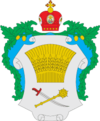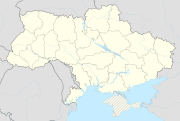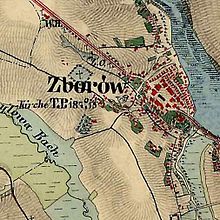Sboriw
| Sboriw | ||
| Зборів | ||

|
|
|
| Basic data | ||
|---|---|---|
| Oblast : | Ternopil Oblast | |
| Rajon : | Sboriv Raion | |
| Height : | no information | |
| Area : | 7.8132 km² | |
| Residents : | 8,700 (2004) | |
| Population density : | 1,114 inhabitants per km² | |
| Postcodes : | 47200-47204 | |
| Area code : | +380 3540 | |
| Geographic location : | 49 ° 40 ' N , 25 ° 9' E | |
| KOATUU : | 6122610100 | |
| Administrative structure : | 1 city, 37 village | |
| Mayor : | Wassyl Martjuk | |
| Address: | вул. Б. Хмельницького 13 47201 м. Зборів |
|
| Statistical information | ||
|
|
||
Sboriw ( Ukrainian Зборів ; Russian Зборов Sborow , Polish Zborów ) is a Ukrainian city in the west of the Ternopil Oblast and the center of the raion of the same name. Sboriw is located in the former Galicia , where it was the seat of a district authority from 1904 .
geography
The city is located 35 kilometers northwest of the oblast capital Ternopil and 85 kilometers southeast of Lviv (Lemberg) on the banks of the Strypa on the Volhyn-Podolian plate . The city is accessed through the Lviv - Vinnytsia trunk road ( N 02 ) and the Lviv – Ternopil railway line .
On October 29, 2017, the city became the center of the newly founded municipality of Sboriw ( Зборівська міська громада Sboriwska miska hromada ), which also includes the 37 villages of Awhustiwka ( Августівка ), Khorobriw ( Хоробуц ), Khorobriw ( Хоробуц ), Khorobriw ( Хоробуц ), Khorobriw ( Хорац )), Khorobriw ( орацр ). , Futory ( Футори ) Harbusiw ( Гарбузів ) Hodiw ( Годів ) Iwatschiw ( Івачів ) Jaroslawytschi ( Ярославичі ) Jartschiwzi ( Ярчівці ) Jossypiwka ( Йосипівка ) Kabariwzi ( Кабарівці ) Kalne ( Кальне ) Kalynivka ( Калинівка ) , Kortschunok ( Корчунок ) Krasna ( Красна ) Manajiw ( Манаїв ) Meteniw ( Метенів ) Monyliwka ( Монилівка ) Mschana ( Мшана ) Nyschtsche ( Нище ) Olijiw ( Оліїв ) Perepelnyky ( Перепельники ) Pidhajtschyky ( Підгайчики ) , Plisnjany ( Плісняни ) Pohribzi ( Погрібці ) Roshadiw ( Розгадів ) Schabynja ( Жабиня ) Schukiwzi ( Жуківці ) Slawna ( Славна ) Welyka Plawutscha ( Велика Плавуча ) Wilschanka ( Вільшанка ) Wirliw ( Вірлів ) Wolossiwka ( Волосівка ), Vovchkivtsi ( Вовчківці ), Zezeniwka ( Цеценівка ) and Zyzory ( Цицори ). Until then, together with the southeastern village of Futory, it formed the city council of the same name.
ethnicities
Ukrainians , Poles , Jews and other nationalities live in the city , with Ukrainians forming the majority.
history
Stone Age finds have been made in the vicinity of Sboriw.
The city was first mentioned in a document from 1166 . In 1241, during the Mongol invasion , it was sacked and destroyed. In 1639 Zborów was granted city rights. The current name is said to be related to the name of the Polish noble family Zborowski . During the Khmelnytskyi uprising , the Polish army was defeated near the city by a Cossack-Crimean Tatar army, after which the Sboriv Treaty was signed between the two sides .
In 1772 the place came under Austrian rule and became part of Galicia . After an administrative reform, the place was from 1854 to 1867 and again from 1904 the seat of the district administration Zborów and remained so until 1918, parallel to this, a district court of the Złoczów district was established in 1876 (until 1904, then the Zborów district). During this time, on December 22nd, 1870, a train station on the route to Tarnopol was opened near the town.
In 1913 Zborów had about 6000 inhabitants, of which 1300 were Poles, 2400 Ukrainians and 2300 Jews. During the First World War , the area around the town was the scene of a battle between the Czechoslovak legionnaires and the Austro-Hungarian army ( Battle of Zborów , July 2, 1917).
After the collapse of the Danube Monarchy during the First World War in November 1918, the city became part of the Western Ukrainian People's Republic (WUVR) . In July 1919 Poland occupied the last parts of this republic. On November 21, 1919, the High Council of the Paris Peace Conference awarded Eastern Galicia to Poland for a period of 25 years.
After the war Zborow came to Poland and was the seat of a powiat within the Tarnopol Voivodeship .
During the Second World War , the city was captured by the Wehrmacht in July 1941. Action groups of the Security Police and the SD murdered the city's Jewish population shortly afterwards. In the summer of 1944 the city was completely destroyed during an offensive by the Red Army .
In the era of the Soviet Union (1944–1991) Zborów, now called Sboriw in Ukrainian, was rebuilt. Smaller industrial companies (construction industry, food industry) were settled in the 1960s. The state-owned agricultural enterprise ( sovkhoz ) in Sboriw was considered one of the best in the region.
In the 1980s, the city was further developed through government investment. A cinema, an agricultural trading company, a new secondary school, a boat rental, a football stadium, a town hall and a cultural center were built.
After the collapse of the Soviet Union and the planned economy, the local economy also suffered a significant decline. Since the 1990s, many able-bodied residents have therefore left the city to work as cheap labor in Western Europe or Russia. Today, however, there are many residents who commute to Ternopil and Lviv every day to work there.
Political Affiliation
In the period from 1550 until today (2008), Ternopil belonged to the following states:
- 1569 - 1772 in the province Ruthenia, an administrative unit of Poland-Lithuania;
- 1772 - 1918 Austrian Empire, from 1867 Austria-Hungary;
- 1918 - 1939 part of the Province Tarnopol, an administrative unit of the Second Republic of Poland;
- 1939 - 1991 part of the Soviet Union;
- from 1991 part of Ukraine
sons and daughters of the town
- Mikolaj Skorodynski (1751 / 1757–1805), Greek Catholic bishop of Lemberg
- Milena Rudnyzka (1892–1976), political activist, educator, journalist and writer, Polish MP and feminist
See also
- Battle of Zborów (1917)
Web links
Individual evidence
- ↑ Про перші вибори депутатів сільських, селищних, міських рад об'єднаних територіальних громад і відповідних сільських, селищних, міських голів 29 жовтня 2017 року
- ^ Reichsgesetzblatt of April 24, 1854, No. 111, page 401
- ^ Reichs-Gesetz-Blatt for the Empire of Austria. Born in 1904, XLVI. Piece, No. 88: "Announcement of the Ministry of the Interior of August 17, 1904"




